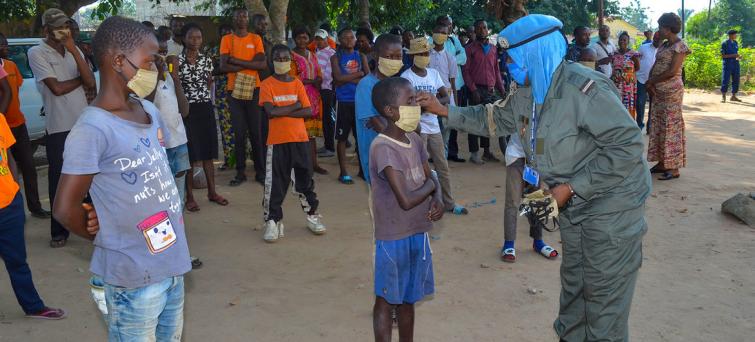
Amidst COVID-19 challenges, UN ‘remains operational’ across Central Africa
New York/IBNS: The coronavirus pandemic has compounded increasing economic, social and humanitarian challenges facing States and regional institutions across Central Africa, the regional UN envoy told the Security Council on Friday.
Despite the health crisis, Special Representative François Louncény Fall underscored that the UN Regional Office for Central Africa (UNOCA) “remains operational”.
In addition, the Head of UNOCA, stressed that "the pressing question of the impact of climate change on peace and security in Central Africa remains a major priority in our efforts to prevent conflicts and sustain peace in this subregion".
Noting that the region had recorded its first case of COVID-19 on 6 March 2020, and that to date, all 11 member countries of the Economic Community of Central African States (ECCAS) are affected, he maintained that UNOCA continues to support the Community, during this crucial period of its evolution”.
Fall said that World Health Organization (WHO) figures show 21,929 laboratory-confirmed cases and 462 deaths reported for the Central African States as of Thursday.
Economic fallout
Citing ECCAS experts, the UN envoy flagged that a 2.3 per cent contraction in growth this year was forecast throughout Central Africa.
He conveyed that the slowdown in economic activities due to COVID-19 “deprives States of the resources they need to address the socio-economic impact of the pandemic, with the risk of creating social unrest”.
“As governments are forced to choose between urgent public health expenditures and other priorities, they risk lacking the resources needed for the smooth functioning of national institutions and the financing of crucial reforms”, detailed Fall.
To address the pandemic, he elaborated on a four-axes Regional Response Strategy that focuses on preventing its spread; managing cases and limiting the death rate; addressing the socio-economic and security impacts; and responding to cross-border security issues created by the pandemic.
Other COVID challenges
Despite the Secretary-General’s call on 23 March for a global ceasefire, a number of conflicts continued in the subregion, undermining response efforts to COVID-19 challenges, according to the Special Representative.
And while Fall commended States for their efforts to limit the impact of the pandemic on economic and social rights, he also reminded governments to ensure that law enforcement agents “abide by human rights principles and standards” as they “carefully and proportionately” apply restrictive measures to stem the virus from spreading.
Unabated armed attacks
Meanwhile, terrorist and armed groups have continued to destabilize the subregion.
“I strongly condemn deliberate attacks on civilians, and the destruction of private property and public infrastructure, including hospitals”, said the UNOCA head, calling for greater international support to implement the Regional Strategy for the Stabilization, Recovery and Resilience of the Boko Haram-affected Areas of the Lake Chad Basin.
Spotlighting that the self-styled Lord's Resistance Army rebel group (LRA), “continues to kill, loot and abduct civilians and children”, particularly in the Democratic Republic of the Congo, he called on regional actors and international partners to finally defeat the militant cult-like organization by strengthening cooperation and mobilizing resources within the UN regional strategy framework.
He also informed the 15-member Council that the impact of climate change on peace and security in Central Africa remains “a major priority” in preventing conflicts and sustaining peace as does the mounting threat of maritime insecurity in the Gulf of Guinea, which he called “a top priority on our agenda”.
Good governance
The Special Representative stated that Central African States have increased efforts to “improve good governance and respond to challenging internal situations that threaten their stability”.
“In several countries, legal proceedings were instituted against prominent personalities over allegations of embezzlement of public resources”, he asserted, noting that other positive actions had been taken in Cameroon and Sao Tome and Principe.
Fall reiterated that Central Africa continues to face many challenges that area being amplified by COVID-19 “to an extent that we cannot yet accurately assess”.
“The individual and collective measures taken by the countries of the subregion to contain the pandemic and meet the other challenges facing them are encouraging and deserve the support of the international community”, he concluded.
Support Our Journalism
We cannot do without you.. your contribution supports unbiased journalism
IBNS is not driven by any ism- not wokeism, not racism, not skewed secularism, not hyper right-wing or left liberal ideals, nor by any hardline religious beliefs or hyper nationalism. We want to serve you good old objective news, as they are. We do not judge or preach. We let people decide for themselves. We only try to present factual and well-sourced news.







